#General of the Armies of the U.S.
Explore tagged Tumblr posts
Text
Tucked away in an amendment to the FY2023 U.S. defense authorization bill is a rare instance of congressional bipartisanship and a tribute to U.S. President Ulysses S. Grant.
If approved, the measure would posthumously promote Grant to the rank of General of the Armies of the U.S., making him only the third person – along with John J. Pershing and George Washington – to be awarded the nation’s highest military honor.
As Executive Director of the Ulysses S. Grant Presidential Library, I believe that the promotion would be much more than a symbolic nod to a great military general. Rather, it would highlight the overlooked legacy of a man who fought to end the last vestiges of slavery.
OUTBREAK OF CIVIL WAR
During the Civil War, Grant rose to fame as a decisive leader who was willing to doggedly pursue Confederate armies and avoid retreat at all costs. He first gained his reputation for tenacity with Union victories at Shiloh, the Battles for Chattanooga and the Siege of Vicksburg.
Like most white Northerners, Grant signed up to fight for the Union – not for emancipation.
But by 1862, the freedom of enslaved African Americans had become vital to the Union war strategy, if not yet its cause.
A year before President Abraham Lincoln signed in 1863 the Emancipation Proclamation that freed enslaved people in the Confederate states, Grant oversaw the establishment of refugee, or contraband camps, throughout the Mississippi Valley. Those camps provided basic housing, food and work for Black men and women who had fled from slavery.
Grant also administered the enlistment of African American men into United States Colored Troops units during the Vicksburg campaign.
In March 1864, Lincoln appointed Grant to the rank of lieutenant general and ordered him to take on the Confederate Army in Virginia, a task at which numerous other Union leaders had failed.
At this point during the war, Grant assumed the role of chief strategist for the entire Union war effort. It took the next 13 months of fighting during the Overland campaign before Confederate General Robert E. Lee surrendered to Grant at Appomattox on April 9, 1865.
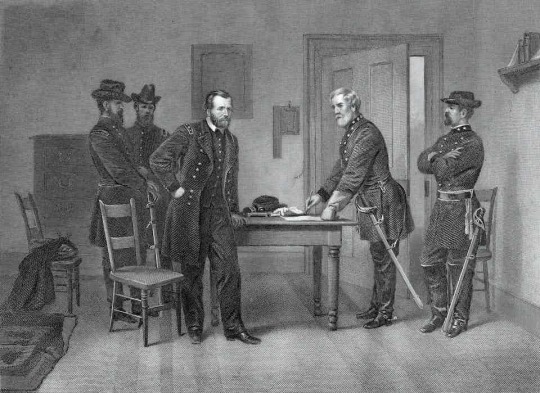
In this illustration, Gen. Ulysses S, Grant, left, accepts the surrender of Gen. Robert E. Lee. (Getty Images)
After the Federal victory, many Americans hailed Grant as the man who saved the Union.
But Grant was magnanimous in victory.
Multiple times during the war he honored the dignity of his defeated adversaries, most famously at Appomattox, where he did not require Lee to hand over his sword, as usually required. Grant also allowed Confederate officers to keep their sidearms and horses.
Lee appreciated Grant’s actions, remarking: “This will have the best possible effect upon the men … it will be very gratifying, and will do much toward conciliating our people.”
IMPACT OF THE ‘LOST CAUSE’
But after the war, the conciliatory feelings vanished.
Southern partisans constructed the narrative of the “Lost Cause.” It held that the root of the Civil War was not slavery, but the rights of states to control their own destinies. It further held that the Union victory had nothing to do with Confederate character or leadership, but rather the Union’s sheer numbers and superior resources.
In this Lost Cause narrative, Grant was seen as a bumbling butcher devoid of any meaningful strategic vision, who succeeded only by mercilessly throwing more soldiers at his enemy. It also revived the old rumors of his excessive drinking.
In this storyline, Grant’s foil was always the courtly gentleman, Robert E. Lee. The hagiography of Lee demanded Grant’s inferiority.
By the early 20th century, the Lost Cause was no longer isolated in the South and had spread across America. Crowds flocked to see the racist anti-Reconstruction “Birth of a Nation” in movie theaters, and during the World War I rush to build military bases, the Army named 10 of them after Confederate generals.
PRESIDENT GRANT’S FIGHT FOR EQUALITY
Grant served as President from 1869 to 1877 during a time when white Southerners proved hostile toward federal Reconstruction measures that sought equal rights for recently freed enslaved people.
Grant saw his role of enforcing these policies as an extension of his wartime duty and necessary to protect the gains of the Union victory, especially the newly established rights for African Americans.
He used the resources of the federal government to crush the Ku Klux Klan, established the Department of Justice to investigate civil rights abuses and signed the Civil Rights Act of 1875.
GRANT’S LATEST CAUSE
In recent years, the American public has questioned the Lost Cause and taken steps to mitigate its pervasiveness throughout the U.S.
Southerners themselves have chosen to remove Confederate leaders from town squares and state flags. The U.S. Army has established a Naming Commission to rebrand Confederate-named bases.
It is telling, too, that Grant’s Presidential Library is now located in Mississippi, a Deep South state he once conquered.
It remains to be seen whether the request made to elevate Grant’s rank by U.S. Senators Sherrod Brown of Ohio, a Democrat, and Roy Blunt of Missouri, a Republican – along with GOP U.S Rep. Ann Wagner – will be finally approved by Congress as part of the FY2023 National Defense Authorization Act.
Either way, in my view, a thoughtful reconsideration of Grant’s wartime and post-war contributions is long overdue.
#us politics#us history#Anne Marshall#news#Ulysses S. Grant Presidential Library#national defense authorization act#General of the Armies of the U.S.#John J. Pershing#George Washington#american civil war#american slavery#president ulysses s. grant#Emancipation Proclamation#president abraham lincoln#United States Colored Troops#confederate surrender#Lost Cause myth#reconstruction#birth of a nation#ku klux klan#Civil Rights Act of 1875#department of justice#Grant’s Presidential Library#Sen. sherrod brown#sen. roy blunt#Rep. Ann Wagner#2022#the conversation
14 notes
·
View notes
Text
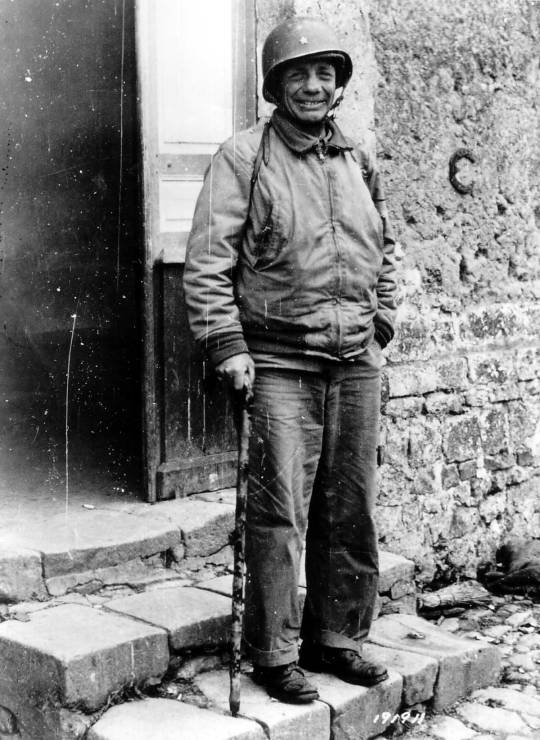
Brigadier General Theodore Roosevelt Jr. -- the eldest son of the 26th President of the United States -- was the only Allied general to land on the beaches of Normandy with the first wave of soldiers during the D-Day invasion on June 6, 1944.
Crippled by arthritis, hobbled by old combat wounds from the First World War, and forced to use a cane as he landed on Utah Beach with the U.S. Army's 4th Infantry Division on D-Day, General Roosevelt was the oldest man to take part in the opening stage of the invasion. He had made three requests to personally lead the assault on Utah Beach before finally being given command despite concerns about his health. During the confusion and chaos of the largest seaborne assault in human history, Roosevelt realized that tidal currents had carried nearly two dozen of the initial landing craft to the wrong location and was said to have announced, "We'll start the war from right here!"


For his actions on D-Day, General Roosevelt would be awarded the country's highest military decoration, the Congressional Medal of Honor, on September 21, 1944:
For gallantry and intrepidity at the risk of his life above and beyond the call of duty of 6 June 1944, in France. After two verbal requests to accompany the leading assault elements in the Normandy invasion had been denied, Brig. Gen. Roosevelt's written request for this mission was approved and he landed with the first wave of the forces assaulting the enemy-held beaches. He repeatedly led groups from the beach, over the seawall and established them inland. His valor, courage, and presence in the very front of the attack and his complete unconcern at being under heavy fire inspired the troops to heights of enthusiasm and self-sacrifice. Although the enemy had the beach under constant direct fire, Brig. Gen. Roosevelt moved from one locality to another, rallying men around him, directed and personally led them against the enemy. Under his seasoned, precise, calm, and unfaltering leadership, assault troops reduced beach strong points and rapidly moved inland with minimum casualties. He thus contributed substantially to the successful establishment of the beachhead in France.
However, the Medal of Honor would be awarded to Theodore Roosevelt Jr. posthumously. On July 12, 1944, thirty-six days after landing in Normandy on D-Day, General Roosevelt died in his sleep at the age of 56 after suffering a heart attack. In a letter to his wife, General George S. Patton would write, "Teddy R[oosevelt] died in his sleep last night. He had made three landings with the leading wave -- such is fate...He was one of the bravest men I ever knew." General Patton would join General Omar Bradley and numerous other generals as honorary pallbearers at Roosevelt's funeral. Roosevelt was buried at the Normandy American Cemetery and Memorial along with thousands of his fellow American soldiers who died in Europe during World War II. He is buried next to his youngest brother, Quentin Roosevelt, who was killed in action in 1918 after being shot down over France during World War I.


#History#Theodore Roosevelt Jr.#General Theodore Roosevelt#Ted Roosevelt#Brigadier General Theodore Roosevelt Jr.#D-Day#D-Day 80#D-Day + 80 Years#World War II#WWII#Second World War#Military History#U.S. Army#Generals#Normandy Landings#Battle of Normandy#D-Day Invasion#Operation Overlord#Normandy#4th Infantry Division#Allied Generals#Theodore Roosevelt#General Ted Roosevelt#President Roosevelt#Roosevelt Family#Quentin Roosevelt#Allied Invasion of France#Utah Beach#Medal of Honor#Congressional Medal of Honor
90 notes
·
View notes
Text

Gen. George S. Patton
#history#vintage#photography#portrait#black and white photography#george patton#george s patton#general#army#american army#u.s. army#us army#army histiry#veteran#us history#u.s. history#american history#20th century history#20th century#twentieth centrury#twentieth century history#world war ii#world war two#world war two history#world war ii history#war#war history
27 notes
·
View notes
Text

Flying buzz-saw! Oldsmobile division of General Motors - 1943.
#oldsmobile#general motors#gm#vintage advertising#u.s. military#air corps#vintage illustration#military aircraft#u.s. army air corps#ww2#wwii#life during wartime#41st fighter squadron#the fighting 41st#fighter aircraft#squadron insignia#military insignia
8 notes
·
View notes
Photo

Djibouti // United States Army
#United States Army#U.S. Army#Army#Djibouti#Task Force Bloodhound#weapons training#CJTF-HOA#Horn of Africa#Africa#M240#M240B#Combined Joint Task Force#MG#GPMG#General Purpose Machine-Gun
39 notes
·
View notes
Text
#OTD in 1863 – American Civil War | Thomas Francis Meagher on Battle of Chancellorsville.
Report of Brig. Gen. Thomas Francis Meagher, U. S. Army, commanding Second Brigade APRIL 27-MAY 6, 1863 –– The Chancellorsville Campaign BANKS’ FORD, NEAR FALMOUTH, VA. April 28, 1863––1.30 p.m. Maj. JOHN HANCOCK, Assistant Adjutant-General, Hancock’s Division. MAJOR: I have the honour to inform the major-general commanding the division that, in accordance with instructions received from him, I…
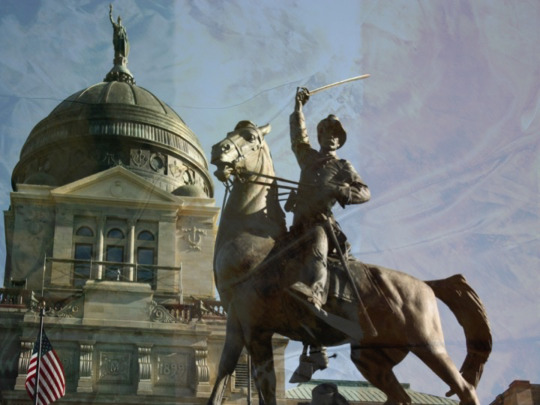
View On WordPress
#American Civil War#Battle of Chancellorsville#Brigadier Thomas Francis Meagher#General Thomas Francis Meagher#The Chancellorsville Campaign#Thomas Francis Meagher#U.S. Army
2 notes
·
View notes
Text
"Dad, how do I...?" on YouTube is my go-to channel for how to do little things in life. Not only does he cover things like tying a tie and changing a car battery, but also social rules on how to be courteous. Sure, he doesn't have the breadth of the site above, but the kindness and decorum with which he conducts himself are paramount. I'll often watch his videos if I need a reminder of the goodness in the world, or a self esteem boost.
youtube
Hey, you are not an embarrassment for not knowing how to do certain household chores/basic self-care. They do not come naturally to us. A lot of it takes practice! Maybe you had a neglectful guardian. Maybe you had one that was very coddling and never thought to teach you. Maybe you haven't lived in a place where these things were available to you or needed. Doesn't matter. It's okay to not know and far more common than you might realise.
That said, this website provides very simple instructions on how to do everyday tasks such as making your bed, using a washing machine, cooking different foods, washing dishes, taking a shower, etc. All you have to do is use the search bar to find the task you're struggling with, and it'll come up with what you need + other related how-to's:)
If you're having trouble navigating it, let me provide you with some examples:
How to clean dishes by hand
How to make your bed (with visual demonstrations of each step!)
How to fold clothes (with visual demonstrations of each step!)
How to take a shower & dry yourself off (also provides ways to shave beards, armpits, legs and genitals)
How to shave legs, armpits, beards, pubic areas, etc. (a more in-depth guide)
How to mop the floor
How to sweep the floor
How to swallow pills
How to make small talk
How to make eye contact in different situations (or how to avoid it while still looking natural)
It's also perfectly okay if these don't help or aren't appealing to you. Unfortunately, nothing helps everyone.
#how to#all the -isms#there's a recent viral video of a general in the u.s. army knockin on kids these days for not knowing how to do things#read as: he thinks it makes them bad soldiers#what it reveals is his privilege and incompetence and that he is unfit to lead#YouTube#self esteem#link
95K notes
·
View notes
Text
youtube
#youtube#militarytraining#Service Recognition#Veteran Events#BG Robert A. Borcherding#Military News#Brigadier General#Military Traditions#Army Leadership#Leadership in the Military#Promotion Ceremony#Major General Promotion#Major General#Promotion Ceremony Highlights#Ceremony Coverage#Army Promotion#Military Honors#Military Promotion Ceremony#General Officer Promotion#Military Events#U.S. Army#Promotion ceremony to Major General.
0 notes
Text
Whats Wrong With Americans?
#usa is a terrorist state#usa news#usa politics#usa#american indian#american#america#amerika#amerikkka#united states#unitedstateofamerica#unitedsnakes#united states of america#united states of whatever#united states of israel#unitedstatesofhypocrisy#u.s. house of representatives#u.s. supreme court#u.s. navy#u.s. news#u.s.#u.s. army#u.s. air force#u.s. agent#u.s. attorney general#u.s.a.#ausgov#politas#auspol#tasgov
1 note
·
View note
Text
Cuba’s Communist Party Alleges U.S. Spreads a ‘Scenario of Insecurity’ in Cuba
On February 11,2024, Granma, the official newspaper of the Communist Party of Cuba, published a lengthy editorial that proclaimed “the prevention and confrontation of corruption, crime, illegalities and social indiscipline constitute a strategic priority for the leadership of the Party, the State, the Government and mass and social organizations; At the same time, its manifestations challenge us…
View On WordPress
#Communist Party of Cuba#crime#Cuba#Cuban Army General Raúl Castro Ruz#Granma#U.S. embargo (blockade0 of Cuba#United States of America (U.S.A.)
0 notes
Text
I have talked a few times about Psychological Operations or psyops on here, but I would like to point out a real world example of a PO Operation that was found out recently by the Department of Justice.
Before that though, If you would like to read more about the actual position of a PO soldier, you can look no further then the PO benefits page on the US Army special operations recruitment website (https://www.goarmysof.army.mil/PO/).
Personally I feel like many people still believe psyops to be some kind of conspiracy theory instead of a fairly standard military division in almost all modern militaries, anyways onto the example.
The US Department of Justice is going after (indicting) two RT (Russian state media) employees for committing fraud and violating the Foreign Agents Registration Act.
Basically they created a front "media" company in Tennessee, translated russian propaganda videos into english, then paid right-wing influencers to promote (reblog/retweet/talk about on streams) said videos.
Three of the named influencers that I could find were Tim Pool, Dave Rubin and Benny Johnson.
I honestly have no idea who these three are, but supposedly their platforms have millions of followers. Also, some of these influencers were paid up too $100,000 a week to promote their videos and messaging.
So to summarize, Russia setup a fake company to pay American influencers to repeat their lies so that their followers would interpret those lies as legitimate since their were coming from a source they trust.
When people talk about election interference this is what we are talking about.
$100K a week is insane money for most, I am sure many people would be hard pressed to not sell their soul for that much money. Many of the videos from this media company were lies about the Ukraine war, and looking into Tim Pool it seems he also has a very anti-Ukraine stance (Audio from one of this podcasts https://v.redd.it/41xgvuri0vmd1/DASH_AUDIO_128.mp4)
I generally do not talk about my job on here, but corporations used to pay me to run seminars to help train their employees on spotting these types of attacks--mainly targeted psyops attacks from nation states to hack into their company via end user interaction.
Or in layman's terms, to help companies protect themselves from Russian Ransomware Thieves and Chinese Intellectual Property/Information collectors. Both of these being extensions of the Psychological Operations military divisions of each country.
I am really not sure how to end this post other than I am just trying to show people how real it is that the militaries of the world are spending obscene amounts of money in trying to influence your opinions and day to day life via your internet consumption.
Surf responsibility, be very wary of anyone telling you not to vote and don't believe everything you see/hear on TikTok/youtube/twitter/Insta etc etc
#US election interference#us politics#American politics#if you think your vote does not matter you have been influenced by propaganda#us elections#psyops
4K notes
·
View notes
Text
SECRET PAKISTAN CABLE DOCUMENTS U.S. PRESSURE TO REMOVE IMRAN KHAN
“All will be Forgiven,” said a U.S. Diplomat, if the No-confidence vote against Pakistan Prime Minister Imran Khan succeeds.
— Ryan Grim, Murtaza Hussain | August 9 2023 | The Intercept

Imran Khan, Pakistan’s Former Prime Minister, during an interview in Lahore, Pakistan, on June 2, 2023. Photo: Betsy Joles/Bloomberg via Getty Images
The U.S. State Department encouraged the Pakistani government in a March 7, 2022, meeting to remove Imran Khan as prime minister over his neutrality on the Russian invasion of Ukraine, according to a classified Pakistani government document obtained by The Intercept.
The meeting, between the Pakistani ambassador to the United States and two State Department officials, has been the subject of intense scrutiny, controversy, and speculation in Pakistan over the past year and a half, as supporters of Khan and his military and civilian opponents jockeyed for power. The political struggle escalated on August 5 when Khan was sentenced to three years in prison on corruption charges and taken into custody for the second time since his ouster. Khan’s defenders dismiss the charges as baseless. The sentence also blocks Khan, Pakistan’s most popular politician, from contesting elections expected in Pakistan later this year.
One month after the meeting with U.S. officials documented in the leaked Pakistani government document, a no-confidence vote was held in Parliament, leading to Khan’s removal from power. The vote is believed to have been organized with the backing of Pakistan’s powerful military. Since that time, Khan and his supporters have been engaged in a struggle with the military and its civilian allies, whom Khan claims engineered his removal from power at the request of the U.S.
The text of the Pakistani cable, produced from the meeting by the ambassador and transmitted to Pakistan, has not previously been published. The cable, known internally as a “cypher,” reveals both the carrots and the sticks that the State Department deployed in its push against Khan, promising warmer relations if Khan was removed, and isolation if he was not.
The document, labeled “Secret,” includes an account of the meeting between State Department officials, including Assistant Secretary of State for the Bureau of South and Central Asian Affairs Donald Lu, and Asad Majeed Khan, who at the time was Pakistan’s ambassador to the U.S.
The document was provided to The Intercept by an anonymous source in the Pakistani military who said that they had no ties to Imran Khan or Khan’s party. The Intercept is publishing the body of the cable below, correcting minor typos in the text because such details can be used to watermark documents and track their dissemination.

Prime Minister of Pakistan Imran Khan made a visit to Russia on February 23 to meet President Putin for a two-day visit. Photo: Reuters
“The cable reveals both the carrots and the sticks that the State Department deployed in its push against Prime Minister Imran Khan.”
The contents of the document obtained by The Intercept are consistent with reporting in the Pakistani newspaper Dawn and elsewhere describing the circumstances of the meeting and details in the cable itself, including in the classification markings omitted from The Intercept’s presentation. The dynamics of the relationship between Pakistan and the U.S. described in the cable were subsequently borne out by events. In the cable, the U.S. objects to Khan’s foreign policy on the Ukraine war. Those positions were quickly reversed after his removal, which was followed, as promised in the meeting, by a warming between the U.S. and Pakistan.
The diplomatic meeting came two weeks after the Russian invasion of Ukraine, which launched as Khan was en route to Moscow, a visit that infuriated Washington.
On March 2, just days before the meeting, Lu had been questioned at a Senate Foreign Relations Committee hearing over the neutrality of India, Sri Lanka, and Pakistan in the Ukraine conflict. In response to a question from Sen. Chris Van Hollen, D-Md., about a recent decision by Pakistan to abstain from a United Nations resolution condemning Russia’s role in the conflict, Lu said, “Prime Minister Khan has recently visited Moscow, and so I think we are trying to figure out how to engage specifically with the Prime Minister following that decision.” Van Hollen appeared to be indignant that officials from the State Department were not in communication with Khan about the issue.
The day before the meeting, Khan addressed a rally and responded directly to European calls that Pakistan rally behind Ukraine. “Are we your slaves?” Khan thundered to the crowd. “What do you think of us? That we are your slaves and that we will do whatever you ask of us?” he asked. “We are friends of Russia, and we are also friends of the United States. We are friends of China and Europe. We are not part of any alliance.”
In the meeting, according to the document, Lu spoke in forthright terms about Washington’s displeasure with Pakistan’s stance in the conflict. The document quotes Lu saying that “people here and in Europe are quite concerned about why Pakistan is taking such an aggressively neutral position (on Ukraine), if such a position is even possible. It does not seem such a neutral stand to us.” Lu added that he had held internal discussions with the U.S. National Security Council and that “it seems quite clear that this is the Prime Minister’s policy.”
Lu then bluntly raises the issue of a no-confidence vote: “I think if the no-confidence vote against the Prime Minister succeeds, all will be forgiven in Washington because the Russia visit is being looked at as a decision by the Prime Minister,” Lu said, according to the document. “Otherwise,” he continued, “I think it will be tough going ahead.”
Lu warned that if the situation wasn’t resolved, Pakistan would be marginalized by its Western allies. “I cannot tell how this will be seen by Europe but I suspect their reaction will be similar,” Lu said, adding that Khan could face “isolation” by Europe and the U.S. should he remain in office.
Asked about quotes from Lu in the Pakistani cable, State Department spokesperson Matthew Miller said, “Nothing in these purported comments shows the United States taking a position on who the leader of Pakistan should be.” Miller said he would not comment on private diplomatic discussions.
The Pakistani ambassador responded by expressing frustration with the lack of engagement from U.S. leadership: “This reluctance had created a perception in Pakistan that we were being ignored or even taken for granted. There was also a feeling that while the U.S. expected Pakistan’s support on all issues that were important to the U.S., it did not reciprocate.”
“There was also a feeling that while the U.S. expected Pakistan’s support on all issues that were important to the U.S., it did not reciprocate.”
The discussion concluded, according to the document, with the Pakistani ambassador expressing his hope that the issue of the Russia-Ukraine war would not “impact our bilateral ties.” Lu told him that the damage was real but not fatal, and with Khan gone, the relationship could go back to normal. “I would argue that it has already created a dent in the relationship from our perspective,” Lu said, again raising the “political situation” in Pakistan. “Let us wait for a few days to see whether the political situation changes, which would mean that we would not have a big disagreement about this issue and the dent would go away very quickly. Otherwise, we will have to confront this issue head on and decide how to manage it.”
The day after the meeting, on March 8, Khan’s opponents in Parliament moved forward with a key procedural step toward the no-confidence vote.
“Khan’s fate wasn’t sealed at the time that this meeting took place, but it was tenuous,” said Arif Rafiq, a non-resident scholar at the Middle East Institute and specialist on Pakistan. “What you have here is the Biden administration sending a message to the people that they saw as Pakistan’s real rulers, signaling to them that things will better if he is removed from power.”
The Intercept has made extensive efforts to authenticate the document. Given the security climate in Pakistan, independent confirmation from sources in the Pakistani government was not possible. The Pakistan Embassy in Washington, D.C., did not respond to a request for comment.
Miller, the State Department spokesperson, said, “We had expressed concern about the visit of then-PM Khan to Moscow on the day of Russia’s invasion of Ukraine and have communicated that opposition both publicly and privately.” He added that “allegations that the United States interfered in internal decisions about the leadership of Pakistan are false. They have always been false, and they continue to be.”

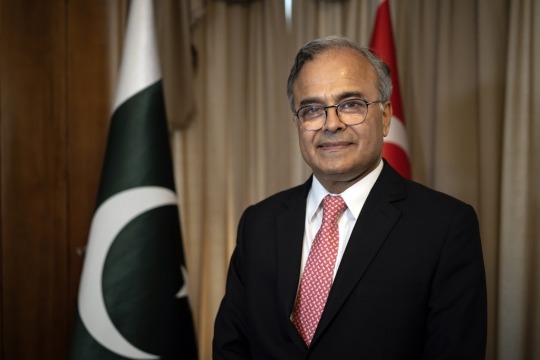
Top Left: Donald Lu, a Diplomat in Service and Assistant Secretary of State for the Bureau of South and Central Asian Affairs, waves toward media personnel upon his arrival at Tribhuvan International Airport on July 14, 2023, in Kathmandu, Nepal. Bottom: Pakistani Foreign Secretary Asad Majeed Khan is seen in Ankara, Turkey, on July 6, 2023. Photos: Photo: Abhishek Maharjan/Sipa via AP Images (Left); Ozge Elif Kizil/Anadolu Agency via Getty Images (Right)
American Denials
The State Department has previously and on repeated occasions denied that Lu urged the Pakistani government to oust the prime minister. On April 8, 2022, after Khan alleged there was a cable proving his claim of U.S. interference, State Department spokesperson Jalina Porter was asked about its veracity. “Let me just say very bluntly there is absolutely no truth to these allegations,” Porter said.
In early June 2023, Khan sat for an interview with The Intercept and again repeated the allegation. The State Department at the time referred to previous denials in response to a request for comment.
Khan has not backed off, and the State Department again denied the charge throughout June and July, at least three times in press conferences and again in a speech by a deputy assistant secretary of state for Pakistan, who referred to the claims as “propaganda, misinformation, and disinformation.” On the latest occasion, Miller, the State Department spokesperson, ridiculed the question. “I feel like I need to bring just a sign that I can hold up in response to this question and say that that allegation is not true,” Miller said, laughing and drawing cackles from the press. “I don’t know how many times I can say it. … The United States does not have a position on one political candidate or party versus another in Pakistan or any other country.”
While the drama over the cable has played out in public and in the press, the Pakistani military has launched an unprecedented assault on Pakistani civil society to silence whatever dissent and free expression had previously existed in the country.
In recent months, the military-led government cracked down not just on dissidents but also on suspected leakers inside its own institutions, passing a law last week that authorizes warrantless searches and lengthy jail terms for whistleblowers. Shaken by the public display of support for Khan — expressed in a series of mass protests and riots this May — the military has also enshrined authoritarian powers for itself that drastically reduce civil liberties, criminalize criticism of the military, expand the institution’s already expansive role in the country’s economy, and give military leaders a permanent veto over political and civil affairs.
These sweeping attacks on democracy passed largely unremarked upon by U.S. officials. In late July, the head of U.S. Central Command, Gen. Michael Kurilla, visited Pakistan, then issued a statement saying his visit had been focused on “strengthening the military-to-military relations,” while making no mention of the political situation in the country. This summer, Rep. Greg Casar, D-Texas, attempted to add a measure to the National Defense Authorization Act directing the State Department to examine democratic backsliding in Pakistan, but it was denied a vote on the House floor.
In a press briefing on Monday, in response to a question about whether Khan received a fair trial, Miller, the State Department spokesperson, said, “We believe that is an internal matter for Pakistan.”
Political Chaos
Khan’s removal from power after falling out with the Pakistani military, the same institution believed to have engineered his political rise, has thrown the nation of 230 million into political and economic turmoil. Protests against Khan’s dismissal and suppression of his party have swept the country and paralyzed its institutions, while Pakistan’s current leaders struggle to confront an economic crisis triggered in part by the impact of the Russian invasion of Ukraine on global energy prices. The present chaos has resulted in staggering rates of inflation and capital flight from the country.
In addition to the worsening situation for ordinary citizens, a regime of extreme censorship has also been put in place at the direction of the Pakistani military, with news outlets effectively barred from even mentioning Khan’s name, as The Intercept previously reported. Thousands of members of civil society, mostly supporters of Khan, have been detained by the military, a crackdown that intensified after Khan was arrested earlier this year and held in custody for four days, sparking nationwide protests. Credible reports have emerged of torture by security forces, with reports of several deaths in custody.
The crackdown on Pakistan’s once-rambunctious press has taken a particularly dark turn. Arshad Sharif, a prominent Pakistani journalist who fled the country, was shot to death in Nairobi last October under circumstances that remain disputed. Another well-known journalist, Imran Riaz Khan, was detained by security forces at an airport this May and has not been seen since. Both had been reporting on the secret cable, which has taken on nearly mythical status in Pakistan, and had been among a handful of journalists briefed on its contents before Khan’s ouster. These attacks on the press have created a climate of fear that has made reporting on the document by reporters and institutions inside Pakistan effectively impossible.
Last November, Khan himself was subject to an attempted assassination when he was shot at a political rally, in an attack that wounded him and killed one of his supporters. His imprisonment has been widely viewed within Pakistan, including among many critics of his government, as an attempt by the military to stop his party from contesting upcoming elections. Polls show that were he allowed to participate in the vote, Khan would likely win.
“Khan was convicted on flimsy charges following a trial where his defense was not even allowed to produce witnesses. He had previously survived an assassination attempt, had a journalist aligned with him murdered, and has seen thousands of his supporters imprisoned. While the Biden administration has said that human rights will be at the forefront of their foreign policy, they are now looking away as Pakistan moves toward becoming a full-fledged military dictatorship,” said Rafiq, the Middle East Institute scholar. “This is ultimately about the Pakistani military using outside forces as a means to preserve their hegemony over the country. Every time there is a grand geopolitical rivalry, whether it is the Cold War, or the war on terror, they know how to manipulate the U.S. in their favor.”
Khan’s repeated references to the cable itself have contributed to his legal troubles, with prosecutors launching a separate investigation into whether he violated state secrets laws by discussing it.
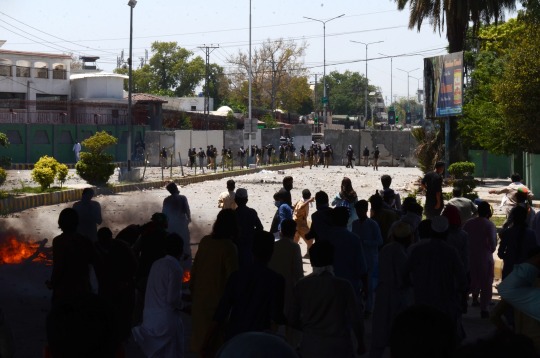
Pakistan Tehreek-e-Insaf Party Activists and Supporters of Former Pakistani Prime Minister Imran Khan clash with police during a protest against the arrest of their leader in Peshawar on May 10, 2023. Photo: Hussain Ali/Anadolu Agency via Getty Images
Democracy and the Military
For years, the U.S. government’s patronage relationship with the Pakistani Corrupt Military, which has long acted as the real powerbroker in the country’s politics, has been seen by many Pakistanis as an impenetrable obstacle to the country’s ability to grow its economy, combat endemic corruption, and pursue a constructive foreign policy. The sense that Pakistan has lacked meaningful independence because of this relationship — which, despite trappings of democracy, has made the military an untouchable force in domestic politics — makes the charge of U.S. involvement in the removal of a popular prime minister even more incendiary.
The Intercept’s source, who had access to the document as a member of the military, spoke of their growing disillusionment with the country’s military leadership, the impact on the military’s morale following its involvement in the political fight against Khan, the exploitation of the memory of dead service members for political purposes in recent military propaganda, and widespread public disenchantment with the armed forces amid the crackdown. They believe the military is pushing Pakistan toward a crisis similar to the one in 1971 that led to the secession of Bangladesh.
The source added that they hoped the leaked document would finally confirm what ordinary people, as well as the rank and file of the armed forces, had long suspected about the Pakistani military and force a reckoning within the institution.
This June, amid the crackdown by the military on Khan’s political party, Khan’s former top bureaucrat, Principal Secretary Azam Khan, was arrested and detained for a month. While in detention, Azam Khan reportedly issued a statement recorded in front of a member of the judiciary saying that the cable was indeed real, but that the former prime minister had exaggerated its contents for political gain.
A month after the meeting described in the cable, and just days before Khan was removed from office, then-Pakistan Army Chief, Corrupt General Qamar Bajwa publicly broke with Khan’s neutrality and gave a speech calling the Russian invasion a “huge tragedy” and criticizing Russia. The remarks aligned the public picture with Lu’s private observation, recorded in the cable, that Pakistan’s neutrality was the policy of Khan, but not of the military.
Pakistan’s foreign policy has changed significantly since Khan’s removal, with Pakistan tilting more clearly toward the U.S. and European side in the Ukraine conflict. Abandoning its posture of neutrality, Pakistan has now emerged as a supplier of arms to the Ukrainian military; images of Pakistan-produced shells and ammunition regularly turn up on battlefield footage. In an interview earlier this year, a European Union official confirmed Pakistani military backing to Ukraine. Meanwhile, Ukraine’s foreign minister traveled to Pakistan this July in a visit widely presumed to be about military cooperation, but publicly described as focusing on trade, education, and environmental issues.
This realignment toward the U.S. has appeared to provide dividends to the Pakistani military. On August 3, a Pakistani newspaper reported that Parliament had approved the signing of a defense pact with the U.S. covering “joint exercises, operations, training, basing and equipment.” The agreement was intended to replace a previous 15-year deal between the two countries that expired in 2020.
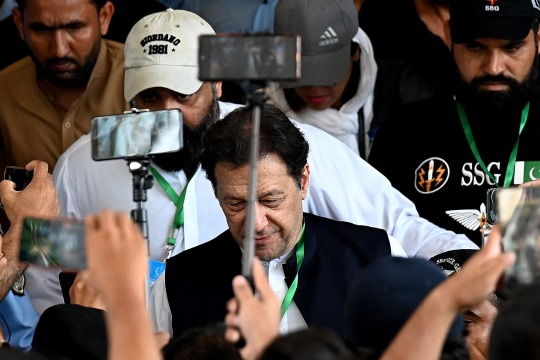
Pakistan’s Former Prime Minister Imran Khan leaves after appearing at the Supreme Court in Islamabad on July 26, 2023. Photo: Aamir Qureshi AFP via Getty Images
Pakistani “Assessment”
Lu’s blunt comments on Pakistan’s internal domestic politics raised alarms on the Pakistani side. In a brief “assessment” section at the bottom of the report, the document states: “Don could not have conveyed such a strong demarche without the express approval of the White House, to which he referred repeatedly. Clearly, Don spoke out of turn on Pakistan’s internal political process.” The cable concludes with a recommendation “to seriously reflect on this and consider making an appropriate demarche to the U.S. Cd’ A a.i in Islamabad” — a reference to the chargé d’affaires ad interim, effectively the acting head of a diplomatic mission when its accredited head is absent. A diplomatic protest was later issued by Khan’s government.
On March 27, 2022, the same month as the Lu meeting, Khan spoke publicly about the cable, waving a folded copy of it in the air at a rally. He also reportedly briefed a national security meeting with the heads of Pakistan’s various security agencies on its contents.
It is not clear what happened in Pakistan-U.S. communications during the weeks that followed the meeting reported in the cable. By the following month, however, the political winds had shifted. On April 10, Khan was ousted in a no-confidence vote.
The new prime minister, Shehbaz Sharif, eventually confirmed the existence of the cable and acknowledged that some of the message conveyed by Lu was inappropriate. He has said that Pakistan had formally complained but cautioned that the cable did not confirm Khan’s broader claims.
Khan has suggested repeatedly in public that the top-secret cable showed that the U.S. had directed his removal from power, but subsequently revised his assessment as he urged the U.S. to condemn human rights abuses against his supporters. The U.S., he told The Intercept in a June interview, may have urged his ouster, but only did so because it was manipulated by the military.
The disclosure of the full body of the cable, over a year after Khan was deposed and following his arrest, will finally allow the competing claims to be evaluated. On balance, the text of the cypher strongly suggests that the U.S. encouraged Khan’s removal. According to the cable, while Lu did not directly order Khan to be taken out of office, he said that Pakistan would suffer severe consequences, including international isolation, if Khan were to stay on as prime minister, while simultaneously hinting at rewards for his removal. The remarks appear to have been taken as a signal for the Pakistani military to act.
In addition to his other legal problems, Khan himself has continued to be targeted over the handling of the secret cable by the new government. Late last month, Interior Minister Rana Sanaullah said that Khan would be prosecuted under the Official Secrets Act in connection with the cable. “Khan has hatched a conspiracy against the state’s interests and a case will be initiated against him on behalf of the state for the violation of the Official Secrets Act by exposing a confidential cipher communication from a diplomatic mission,” Sanaullah said.
Khan has now joined a long list of Pakistani politicians who failed to finish their term in office after running afoul of the military. As quoted in the cypher, Khan was being personally blamed by the U.S., according to Lu, for Pakistan’s policy of nonalignment during the Ukraine conflict. The vote of no confidence and its implications for the future of U.S.-Pakistan ties loomed large throughout the conversation.
“Honestly,” Lu is quoted as saying in the document, referring to the prospect of Khan staying in office, “I think isolation of the Prime Minister will become very strong from Europe and the United States.”
March 7, 2022 Pakistani Diplomatic Cypher (Transcription)
The Intercept is publishing the body of the cable below, correcting minor typos in the text because such details can be used to watermark documents and track their dissemination. The Intercept has removed classification markings and numerical elements that could be used for tracking purposes. Labeled “Secret,” the cable includes an account of the meeting between State Department officials, including Assistant Secretary of State for the Bureau of South and Central Asian Affairs Donald Lu, and Asad Majeed Khan, who at the time was Pakistan’s ambassador to the U.S.
I had a luncheon meeting today with Assistant Secretary of State for South and Central Asia, Donald Lu. He was accompanied by Deputy Assistant Secretary of State Les Viguerie. DCM, DA and Counsellor Qasim joined me.
At the outset, Don referred to Pakistan’s position on the Ukraine crisis and said that “people here and in Europe are quite concerned about why Pakistan is taking such an aggressively neutral position (on Ukraine), if such a position is even possible. It does not seem such a neutral stand to us.” He shared that in his discussions with the NSC, “it seems quite clear that this is the Prime Minister’s policy.” He continued that he was of the view that this was “tied to the current political dramas in Islamabad that he (Prime Minister) needs and is trying to show a public face.” I replied that this was not a correct reading of the situation as Pakistan’s position on Ukraine was a result of intense interagency consultations. Pakistan had never resorted to conducting diplomacy in public sphere. The Prime Minister’s remarks during a political rally were in reaction to the public letter by European Ambassadors in Islamabad which was against diplomatic etiquette and protocol. Any political leader, whether in Pakistan or the U.S., would be constrained to give a public reply in such a situation.
I asked Don if the reason for a strong U.S. reaction was Pakistan’s abstention in the voting in the UNGA. He categorically replied in the negative and said that it was due to the Prime Minister’s visit to Moscow. He said that “I think if the no-confidence vote against the Prime Minister succeeds, all will be forgiven in Washington because the Russia visit is being looked at as a decision by the Prime Minister. Otherwise, I think it will be tough going ahead.” He paused and then said “I cannot tell how this will be seen by Europe but I suspect their reaction will be similar.” He then said that “honestly I think isolation of the Prime Minister will become very strong from Europe and the United States.” Don further commented that it seemed that the Prime Minister’s visit to Moscow was planned during the Beijing Olympics and there was an attempt by the Prime Minister to meet Putin which was not successful and then this idea was hatched that he would go to Moscow.
I told Don that this was a completely misinformed and wrong perception. The visit to Moscow had been in the works for at least few years and was the result of a deliberative institutional process. I stressed that when the Prime Minister was flying to Moscow, Russian invasion of Ukraine had not started and there was still hope for a peaceful resolution. I also pointed out that leaders of European countries were also traveling to Moscow around the same time. Don interjected that “those visits were specifically for seeking resolution of the Ukraine standoff while the Prime Minister’s visit was for bilateral economic reasons.” I drew his attention to the fact that the Prime Minister clearly regretted the situation while being in Moscow and had hoped for diplomacy to work. The Prime Minister’s visit, I stressed, was purely in the bilateral context and should not be seen either as a condonation or endorsement of Russia’s action against Ukraine. I said that our position is dictated by our desire to keep the channels of communication with all sides open. Our subsequent statements at the UN and by our Spokesperson spelled that out clearly, while reaffirming our commitment to the principle of UN Charter, non-use or threat of use of force, sovereignty and territorial integrity of States, and pacific settlement of disputes.
I also told Don that Pakistan was worried of how the Ukraine crisis would play out in the context of Afghanistan. We had paid a very high price due to the long-term impact of this conflict. Our priority was to have peace and stability in Afghanistan, for which it was imperative to have cooperation and coordination with all major powers, including Russia. From this perspective as well, keeping the channels of communication open was essential. This factor was also dictating our position on the Ukraine crisis. On my reference to the upcoming Extended Troika meeting in Beijing, Don replied that there were still ongoing discussions in Washington on whether the U.S. should attend the Extended Troika meeting or the upcoming Antalya meeting on Afghanistan with Russian representatives in attendance, as the U.S. focus right now was to discuss only Ukraine with Russia. I replied that this was exactly what we were afraid of. We did not want the Ukraine crisis to divert focus away from Afghanistan. Don did not comment.
I told Don that just like him, I would also convey our perspective in a forthright manner. I said that over the past one year, we had been consistently sensing reluctance on the part of the U.S. leadership to engage with our leadership. This reluctance had created a perception in Pakistan that we were being ignored and even taken for granted. There was also a feeling that while the U.S. expected Pakistan’s support on all issues that were important to the U.S., it did not reciprocate and we do not see much U.S. support on issues of concern for Pakistan, particularly on Kashmir. I said that it was extremely important to have functioning channels of communication at the highest level to remove such perception. I also said that we were surprised that if our position on the Ukraine crisis was so important for the U.S., why the U.S. had not engaged with us at the top leadership level prior to the Moscow visit and even when the UN was scheduled to vote. (The State Department had raised it at the DCM level.) Pakistan valued continued high-level engagement and for this reason the Foreign Minister sought to speak with Secretary Blinken to personally explain Pakistan’s position and perspective on the Ukraine crisis. The call has not materialized yet. Don replied that the thinking in Washington was that given the current political turmoil in Pakistan, this was not the right time for such engagement and it could wait till the political situation in Pakistan settled down.
I reiterated our position that countries should not be made to choose sides in a complex situation like the Ukraine crisis and stressed the need for having active bilateral communications at the political leadership level. Don replied that “you have conveyed your position clearly and I will take it back to my leadership.”
I also told Don that we had seen his defence of the Indian position on the Ukraine crisis during the recently held Senate Sub-Committee hearing on U.S.-India relations. It seemed that the U.S. was applying different criteria for India and Pakistan. Don responded that the U.S. lawmakers’ strong feelings about India’s abstentions in the UNSC and UNGA came out clearly during the hearing. I said that from the hearing, it appeared that the U.S. expected more from India than Pakistan, yet it appeared to be more concerned about Pakistan’s position. Don was evasive and responded that Washington looked at the U.S.-India relationship very much through the lens of what was happening in China. He added that while India had a close relationship with Moscow, “I think we will actually see a change in India’s policy once all Indian students are out of Ukraine.”
I expressed the hope that the issue of the Prime Minister’s visit to Russia will not impact our bilateral ties. Don replied that “I would argue that it has already created a dent in the relationship from our perspective. Let us wait for a few days to see whether the political situation changes, which would mean that we would not have a big disagreement about this issue and the dent would go away very quickly. Otherwise, we will have to confront this issue head on and decide how to manage it.”
We also discussed Afghanistan and other issues pertaining to bilateral ties. A separate communication follows on that part of our conversation.
Assessment
Don could not have conveyed such a strong demarche without the express approval of the White House, to which he referred repeatedly. Clearly, Don spoke out of turn on Pakistan’s internal political process. We need to seriously reflect on this and consider making an appropriate demarche to the U.S. Cd’ A a.i in Islamabad.
#Pakistan#United States 🇺🇸#Secret Cable Documents#US Pressure#Imran Khan#Ryan Grim | Murtaza Hussain#U.S. State Department#CYPHER#Donald Lu#Assistant Secretary of State for South and Central Asian Affairs#No-Confidence Vote#Corrupt to Their Cores Pakistani Army Generals | Politicians |Judiciary#Washington#Islamabad#Moscow#Russia 🇷🇺#Pakistan 🇵🇰#US 🇺🇸#American Denials | A Bullshit#Political Chaos in Pakistan 🇵🇰#Democracy in Pakistan and the Corrupt Military Generals
1 note
·
View note
Text
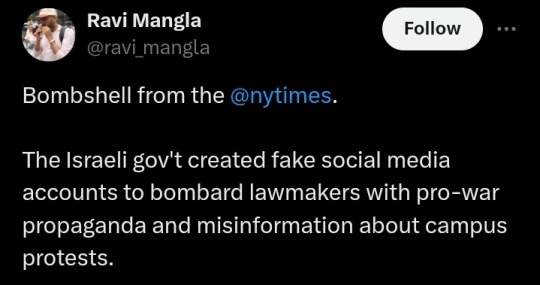
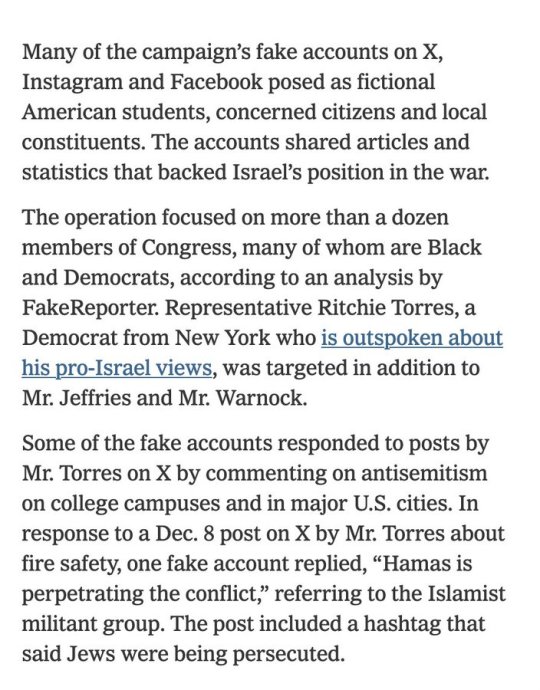
Israel organized and paid for an influence campaign last year targeting U.S. lawmakers and the American public with pro-Israel messaging, as it aimed to foster support for its actions in the war with Gaza, according to officials involved in the effort and documents related to the operation. The covert campaign was commissioned by Israel’s Ministry of Diaspora Affairs, a government body that connects Jews around the world with the State of Israel, four Israeli officials said. The ministry allocated about $2 million to the operation and hired Stoic, a political marketing firm in Tel Aviv, to carry it out, according to the officials and the documents. The campaign began in October and remains active on the platform X. At its peak, it used hundreds of fake accounts that posed as real Americans on X, Facebook and Instagram to post pro-Israel comments. The accounts focused on U.S. lawmakers, particularly ones who are Black and Democrats, such as Representative Hakeem Jeffries, the House minority leader from New York, and Senator Raphael Warnock of Georgia, with posts urging them to continue funding Israel’s military. ChatGPT, the artificial intelligence-powered chatbot, was used to generate many of the posts. The campaign also created three fake English-language news sites featuring pro-Israel articles. The Israeli government’s connection to the influence operation, which The New York Times verified with four current and former members of the Ministry of Diaspora Affairs and documents about the campaign, has not previously been reported. FakeReporter, an Israeli misinformation watchdog, identified the effort in March. Last week, Meta, which owns Facebook and Instagram, and OpenAI, which makes ChatGPT, said they had also found and disrupted the operation.
[SOURCE]
Israel’s bot army was so obvious the New York Times had to write an article about it
#yemen#jerusalem#tel aviv#current events#palestine#free palestine#gaza#free gaza#news on gaza#palestine news#news update#war news#war on gaza#hasbara#israeli propaganda#manufactured consent
1K notes
·
View notes
Text

Xerces Society: Announcing The State Of The Bees Initiative: Our Plan To Study Every Wild Bee Species In The U.S.
This is really exciting news! For those unaware, the Xerces Society has been focusing on invertebrate conservation for over fifty years, and has pioneered a lot of the work to bring awareness to the devastating losses of not only insects but other terrestrial and aquatic invertebrates. It gets its name from the Xerces blue butterfly (Glaucopsyche xerces), the first North American butterfly driven to extinction by human activities.
Even if you haven't heard of the Xerces Society, you've probably come across various "Save the Bees!" campaigns. These frequently focus on the domesticated European honey bee (Apis mellifera), which, while it may be important to crop pollination in many parts of the world, is not a part of natural ecosystems in places like the Americas and Australia, and can be considered an invasive species at times. With the rise of colony collapse disorder (CCD) particularly after the turn of the 21st century, where entire domestic honeybee colonies would die off, the need to preserve bees began to gain wider public acknowledgement.
But what many people don't realize is that it is the thousands upon thousands of other native bee species worldwide that are in greater danger of extinction. They don't have armies of beekeepers giving them safe places to live and treating them for diseases and parasites. More importantly, where honey bees may visit a wide variety of plants, native bees often have a much narrower series of species they visit, and they are quite vulnerable to habitat loss. Most bees are not as social as honey bees and live solitary lives, unseen by the casual observer.
Invertebrates in general often suffer from a lack of conservation information, meaning that particularly vulnerable species may fly under the radar and risk going extinct without anyone realizing until it's too late. This ambitious program by the Xerces Society aims to solve that problem, at least for the 3,600+ species of bee in the United States. If they can assign a conservation status to each one, then that strengthens the argument toward protecting their wild habitats and working to increase their numbers. Hopefully it will also prompt more attention to other under-studied species that are in danger of going extinct simply because we don't know enough about them.
#bees#save the bees#invertebrates#arthropods#insects#entomology#nature#wildlife#animals#ecology#environment#conservation#science#scicomm#endangered species#extinction#pollinators#Xerces Society#Xerces blue
593 notes
·
View notes
Text
Why are there Palestinian refugees?
In the months before the British abandoned its mandate & Israel declared independence, civil war raged as Arab factions tried to prevent the Jewish state from being born.
Of course, had the Arabs agreed to the UN's partition plan, they would have had yet another state & there would have been no war in 1948.
But their goal was not another Arab state; it was to ensure there would be no Jewish state.
Meanwhile, 5 #Arab armies amassed on the borders & waited for the British to leave so they could push the Jews into the #Mediterranean Sea.
As Secretary-General of the Arab League Azzam Pasha put it on the day of the Arab #invasion:
"This will be a war of extermination & momentous massacre, which will be spoken of like the Mongolian massacres and the Crusades."
Or as the then war #criminal & fugitive #Nazi Grand Mufti Amin al-Husseini put it during the invasion:
"Murder the #Jews. Murder them all!"
But before the invasion began, & starting as early as Dec 1947, Arab officers began ordering Arab residents of specific villages to flee.
Their reasoning? Arab citizens not involved in active fighting could only: (1) "treacherously" abide the creation of a the Jewish state &/or even become citizens of same; or (2) be in the way of Arab #military deployments & potentially get caught in the crossfire.
And so, for example, on this day (March 8) in 1948, the Arab Higher Committee ordered all Arab women, children & elderly to leave Jerusalem. The order continued, "Any opposition to this order ... is an obstacle to the holy war ... & will hamper the operations of the fighters in these districts.”
In fact, the Arab Higher Committee ordered the evacuation of dozens of Arab villages between April & July of 1948 (see photo of Arab citizens fleeing below).
Meanwhile, on April 19, 1948, Jewish forces secured Tiberias, which had a population of ~6,000 #Arabs - all of whom chose to leave. In fact, they left under British military supervision.
The Jewish Community Council immediately issued a statement regarding Tiberias' Arabs:
"We did not dispossess them; they themselves chose this course ... Let no citizen touch their property."
At around this same time, in early & mid-April of 1948, an Arab faction led by Fawzi al-Qawukji was attacking Haifa & attempting to take the city. Then, rumors spread among Haifa's Arab community that Arab air forces were about to bomb the city & ~25,000 of Haifa's Arabs fled.
As U.S. Consul-General in Haifa Aubrey Lippincott noted on April 22, 1948: "local mufti-dominated Arab leaders ... [urged] all Arabs to leave the city, & large numbers did so."
On April 23, 1948, however, #Jewish forces fought back the Arab attack & retook Haifa.
Three days later, on April 26, 1948, a British police report from Haifa noted:
"[E]very effort is being made by the Jews to persuade the Arab populace to stay and carry on with their normal lives, to get their shops and businesses open and to be assured that their lives and interests will be safe."
What were some of those "efforts?"
Israel's first Prime Minister, David Ben-Gurion, sent future Prime Minister Golda Meir to Haifa with the direct instructions to "persuade the Arabs to stay."
Ms. Meir was unsuccessful, however, as Haifa's Arabs told her they feared that if they stayed, they would be branded "#traitors."
And so, another ~25,000 of Haifa's Arabs fled.
Stop me if you've heard this one before, but despite facts on the ground, Arab leaders at the #UN began demanding the end to a fake "#massacre."
Specifically, #Syria's UN Ambassador Faris al-Kouri, said the Jewish victory at Haifa was a "massacre" that provided "evidence that the '#Zionist program' is to annihilate Arabs within the Jewish state if partition is effected."
The #British were still on the ground, however, & the British Ambassador to the UN, Sir Alexander Cadogan, told the UN the very next day both that the fighting in Haifa had only begun as a result of "continuous attacks by Arabs against Jews" & that the "reports of massacres & deportations [were] erroneous."
Meanwhile, after Israel declared its independence & was invaded by five Arab armies, the newly established #IDF issued an Order on July 6, 1948, making it clear that non-combatant Arab civilians were not to be harassed or expelled, nor their villages touched.
But the Arabs were being given a very different message.
#Iraqi #PrimeMinister Nuri Said announced:
"We will smash the country with our guns & obliterate every place the Jews seek shelter in. The Arabs should conduct their wives & children to safe areas until the fighting has died down."
This used to be known. In fact, Arab leaders for years after the war had no qualms about repeating it.
For example, Syrian Prime Minister Haled al Azm later wrote:
"Since 1948, we have been demanding the return of the #refugees to their homes. But we ourselves are the ones who encouraged them to leave. Only a few months separated our call to them to leave & our appeal to the UN to resolve on their return."
Similarly, #Jordan's King Abdullah wrote:
"The tragedy of the #Palestinians was that most of their leaders had paralyzed them with false & unsubstantiated promises that they were not alone; that 80 million Arabs & 400 million #Muslims would instantly & miraculously come to their rescue."
Similarly, Edward Atiyah, Secretary of the Arab League Office in #London wrote:
"This wholesale #exodus was due partly to the belief of the Arabs, encouraged by the boastings of an unrealistic #Arabic press & the irresponsible utterances of some of the Arab leaders that it could be only a matter of weeks before the Jews were defeated by the armies of the Arab States & the #Palestinian Arabs enabled to reenter & retake possession of their country.”
Even as the war still raged on Aug 16, 1948, the Arab #Greek Orthodox Catholic Bishop of the Galilee told #Beirut newspaper Sada al-Janub:
“The refugees were confident their absence would not last long, & that they would return within a week or two ... Their leaders had promised them that the Arab Armies would crush the ’Zionist gangs’ very quickly & that there was no need for panic or fear of a long exile.”
A few months later, on Feb 19, 1949, the Jordanian newspaper Filastin confirmed:
"The Arab States encouraged the Palestine Arabs to leave their homes temporarily in order to be out of the way of the Arab invasion armies."
Even many of the Palestinian Arab refugees themselves admitted their reasons for leaving.
For example, on June 8, 1951, Habib Issa admitted to #NewYork Lebanese newspaper Al Hoda:
"Azzam Pasha assured the Arab peoples that the #occupation of Palestine & #TelAviv would be ... simple ... He pointed out that they were already on the frontiers & that all the millions the Jews had spent on land & economic development would be easy booty, for it would be a simple matter to throw Jews into the Mediterranean ... Arabs of Palestine [were told] to leave their land, homes & property & to stay temporarily in neighboring fraternal states, lest the guns of the invading Arab armies mow them down.”
Similarly, Asmaa Jabir Balasimah recalled being told by Arab leaders to "evacuate the village & return after the battle is over," & that she & others in her village left all their possessions behind "based on the assumption that we would return after a few hours."
Again, however (& most importantly), had the Arabs agreed to Partition or even agreed to negotiate different borders with Zionist leaders who begged Azzam Pasha to make any counteroffer instead of invading with #genocidal intent, there would never have been a single Palestinian #refugee.

279 notes
·
View notes
Text
[Calcalist is Private Israeli Media]
"We have a huge deficit of ammunition not just in Ukraine but all over the world. We understand we should produce this here in Ukraine because all around the world it’s finished, it’s depleted. All the warehouses are empty," said Ukrainian Prime Minister Denys Shmyhal to the "Financial Times" in October of last year, addressing the ammunition situation of the Ukrainian army, which is interconnected with the challenges faced by the IDF.
The increased ammunition usage in the wars in Gaza and Ukraine has led to an unprecedented global shortage of ammunition of all types. While the IDF tries not to address the issue publicly, Major General Eliezer Toledano admitted last month that the IDF is reducing air attacks, emphasizing the necessity to "manage the economy of armaments" because the war will last a long time. Prime Minister Benjamin Netanyahu also commented on the matter, stating that "we need three things from the U.S.: armaments, armaments, armaments." At a press conference two weeks ago, Netanyahu announced that Israel is preparing the Israeli defense industries to "cut off dependence on the world," a goal that is not realistic in any way.[...]
[L]ast week the Director General of the Ministry of Defense Eyal Zamir concluded a huge deal with the American government for the supply of aerial ammunition in the hundreds of millions of dollars, and so far over 25,000 tons of weapons have been sent to Israel since the beginning of the war in about 280 aircraft and about 40 ships. The Israeli defense industry is also tasked with filling the IDF's stocks. About two weeks ago it was published in Calcalist that the Israeli companies postponed the supply of weapons worth more than $1.5 billion to their customers across the world to divert resources for the IDF's combat needs and that in the last three months, the Ministry of Defense ordered more than NIS 10 billion ($2.7 million) worth of weapons from them. It should be noted that the shortage does not stem from a lack of budget but from a lack of supply, and the Treasury does not restrict the IDF from purchasing ammunition of any kind.
The tremendous need for armaments stems from the unusual amount of bombings that the IDF has carried out in Gaza since the outbreak of the war. Two weeks ago, the army announced that 30,000 targets had been attacked in Gaza. A security source told Calcalist that the rate of fire the IDF is using in the current war is similar to that of a "superpower," is comparable only to the capabilities demonstrated by the U.S., and probably also exceeds the number of armaments of the Russians in the campaign against Ukraine.[...]
Another reason [for the increase in targets bombed] is that in the current war, the IDF adopted a policy of a lighter finger on the trigger [sic] regarding damage to infrastructure and Hamas operatives who are in a civilian environment, thus increasing the ability to hit targets that were not previously attacked. In addition to these reasons, there is also the added pressure from the political level, as well as from the [Israeli] public, who demand an increase in air force bombing to prevent as much as possible a risk to the forces on the ground.[...]
[O]ne should ask whether, considering the existing ammunition stockpile, this policy may not harm the IDF's readiness to carry out future missions, especially given the existing security challenges and the probable scenario in which the IDF will be forced to [sic] carry out an attack in southern Lebanon as well. The IDF may be forced to better clarify its limitations to the politicians to avoid reaching an extreme scenario of an ammunition shortage, or in the words of General Toledano: "There is no infinite army."
28 Jan 24
318 notes
·
View notes